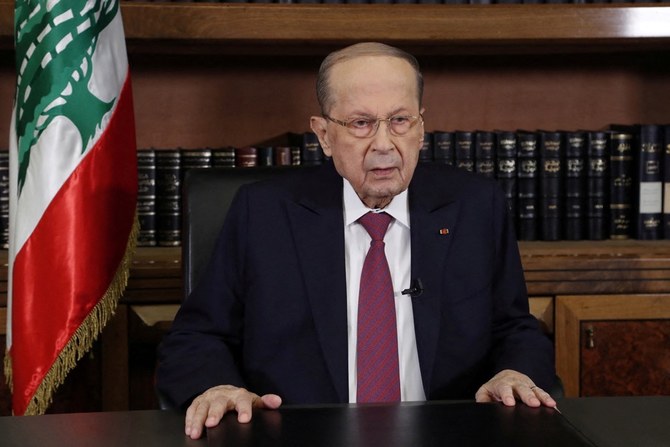BEIRUT: Lebanon’s president settled scores with political opponents as he prepared to leave office, criticizing parliament for failing to elect his replacement and stating that the caretaker government was happy to see the country remain paralyzed.
Michel Aoun also railed against a “hostile” media, claimed he was “conspired against” in efforts to tackle corruption, and held Najib Mikati, the caretaker prime minister, responsible for failing to form a government before the end of his presidential term.
“Everyone conspired against me at home and abroad to prevent me from fighting corruption,” he told journalists at the presidential palace, 48 hours before he was due to leave.
He criticized parliament for failing to elect his successor, and stated that calls by Speaker Nabih Berri for dialogue between opposing factions to find a candidate would fail.
“Berri’s call for the parliamentary blocs to consult each other will fail because Berri does not have the right to call for dialogue,” Aoun said.
Lebanon’s parliament remains paralyzed after a May election that returned a house with no one commanding a clear majority. Hezbollah and its allies have the largest number of seats, and are leading a caretaker administration. Aoun’s Free Patriotic Movement and its allies are the second largest bloc and a third includes non-aligned independents. None of the blocs can agree on a working coalition, and none can command enough votes for a presidential nominee to be elected outright.
Aoun accused Mikati of having no serious intention of forming a government through negotiation.
He demanded that FPM head Gebran Bassil get to choose his ministers like other parties. “Mikati does not adopt the same standards with the Strong Lebanon Bloc and the FPM that he adopts with the Amal Movement, Hezbollah, the Socialist Party, and the rest of the parties. They always blame Bassil.”
Aoun hinted at being “on the verge of signing the decree for the resignation of the caretaker government” — contradicting statements by his media office days ago that he had no such intention.
“If a government is not formed, a caretaker government cannot rule, and I cannot accept a caretaker government,” he said.
Mikati hit back, saying that “Aoun’s memory is betraying him. He is confused between facts, wishes and illusions.”
Aoun will leave the presidential palace on Oct. 30, one day before his term officially ends. He will be accompanied by a convoy of his supporters from the FPM to his villa in Rabieh.
The outgoing president lamented the constant crises he faced while in office, stating that not one official in the country helped him fight corruption. “I did not accept any tutelage state, nor did I accept bribes from any state like many officials have,” he said.
“I have faced hostile media and major and harmful financial, natural, and health disasters. The Beirut port explosion, the closed borders with Syria with 1.8 million refugees in Lebanon, an empty treasury, and now we are facing a cholera outbreak.
Of the financial crisis, Auon said that those responsible “are responsible for the country’s fiscal and monetary policy, all of which must be investigated.
“But those controlling the judicial authority are protecting them.”
The president described the relationship with Hezbollah as serious, saying: “We have a problem with the party regarding the fight against corruption. Hezbollah and the Amal Movement are twins, and separating them may lead to bloodshed.”
Hezbollah chief Hassan Nasrallah reportedly met Bassil on Wednesday to discuss the potential presidential and government vacuum.
Samir Geagea, the head of the Lebanese Forces party which opposes the Hezbollah parliamentary bloc and is a rival of the FPM, noted: “Violating the laws and the constitution has brought us here.”
Geagea accused Hezbollah and the FPM of not wanting to agree on a presidential candidate. “Meanwhile, we have our candidate and we will continue to vote for him. We will respond to Berri’s call for dialogue, provided that he calls for a session to elect a president as soon as possible,” he said.
As a presidential vacuum looms, legal experts stressed that a Mikati government could indeed continue to operate in caretaker mode.
Michel Qlimous, a lawyer, said: “No one can prevent it from operating because Article 64 of the constitution is clear and explicit — until a new government is formed, following constitutional principles and Article 53.”
Should FPM ministers refuse to continue to be part of the caretaker government, its work will not be disrupted and it will still be able to operate within limits if two-thirds of the quorum is secured, he said.
“The constitutional council has previously issued jurisprudence that prevents a vacuum. The decisions of the constitutional council are final and cannot be challenged,” Qlimous added.


























